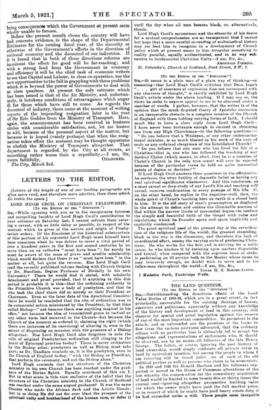LETTERS TO THE EDITOR.
[Letters of the length of one of our leading paragraphs are often more read, and therefore more effective, than those which fill treble the space.]
LORD HUGH CECIL ON CHRISTIAN FELLOWSHIP [To THE EDITOR OF ma " SPECTATOR."] Sin, While agreeing with you as to the oonspicuous fairness and compelling lucidity of Lord Hugh Cecil's contribution to your columns on Saturday last, I cannot refrain from enter- ing a caveat, with as little delay as possible, in respect of the account which he gives of the nature and origin of Presby- terian orders. Of the flimsiness of the historical substructure of this portion of his argument Lord Hugh must himself have been conscious when he was driven to cover a vital period of over a hundred years in the first and second centuries by no more than an ex cathedra "must have been"; for surely he must be aware of the mass of grave and erudite scholarship which would declare that there is no " must have been " in the matter at all, but quite the reverse. Has Lord Hugh Cecil read the recently published volume dealing with Church Origins by Dr. Headlam, Begins Professor of Divinity in his own University? There he would find it stated, with scholarly detachment and proof provided, that if anything in •this dim period is probable it is this—that the ordaining authority in the Primitive Church was a body of presbyters, and that he who took the chief share did so merely as their President or Chairman. Even at the later date of the Apostolical Constitu- tions he would be reminded that the rite of ordination was in its ceremonial action ministered by the President, by that time called Bishop—" not because there was anything magical in his office," not because the idea of transmitted grace in tactual or any other form had occurred to the Church—but because the Church ofthe moment so ordered it, claiming the right (which there are instances of its exercising) of altering it, even to the extent of dispensing on occasion with the presence of a Bishop altogether. Has Lord Hugh Cecil also forgotten to note the relic of original Presbyterian ordination still clinging to the heart of Episcopal practice to-day? There is never ordination by the Bishop sofas; presbyters as well as Bishop must take part; as Dr. Headlam reminds us, it is the presbyters, even in the Church of England to-day, " with the Bishop as President, that perform the ceremony, and not the Bishop alone." Lord Hugh contends that the structure of the Christian ministry in his own Church has been reached under the guid- ance of the Divine Spirit. Equally convinced of this am I. But in what sense is this view exclusive of the belief that the structure of the Christian ministry in the 'Church of Scotland was reached under the same august guidance? It was the same Creator who made the African dark and the Asiatic blonde; but in to doing He did not for ever blast the prospect of the spiritual unity and brotherhood of the human race, or defer it until the day when all men became black, or, alternatively, blonde.
Lord 'Hugh Cecil's earnestness and the sincerity of his desire for a mutual comprehension are -so transparent that I cannot but hope that a more careful re-reading of ecclesiastical history may yet lead him to recognize in a development of Church policy which at present seems to him irregular something in reality parallel, equally authenticated, and in no way *a- versive to fundamental Christian Unity. —I am, Sir, &o., ARCHIBALD -FUMING. St. Columba's, Church of Scotland, Pont Street, S.W. I.


































 Previous page
Previous page